Sales Leadership: The Guide To Empower Selling Performance

To achieve a business’s growth goals, the first place many experts advise and to direct their investments is sales leadership. The reason is simple: If your sales leaders aren’t putting in the work to create a high-performance culture that empowers people and inspires confidence, continual development and genuine human connections, you won’t get very far with anything else you invest in. There are only so many sales reps you can add to the team, and you won’t get the return you’re looking for without strong sales leaders to support them.
Knowing where to invest is only part of the equation, though. You also need to invest in the right kind of development. Effective sales leadership requires not just the skill to lead but the will to recognize and bring out the full potential in people. That’s why a star sales rep won’t automatically make a great sales leader. Moving from salesperson to sales leadership means shifting your mindset toward finding fulfillment in developing others.
What You Will Learn about Sales Leadership:
- What Is A Sales Leader?
- Understand Your Sales Leadership Style
- Qualities Of Sales Leaders and Coaches
- The Skill Set Of Successful Sales Leaders
- Creating A Sales Culture
- Enhancing Sales Leadership With Coaching
- Infographic: How Top Companies Use Sales Coaching
- Recruiting The Right Sales Team Members
- Understand The Behavior Styles Of Your Team
- Integrity Coaching®
What Is A Sales Leader?
The sales leaders who succeed in this transition have high emotional intelligence, strong mentoring skills and a deep commitment to coaching as a critical part of their job. Regular coaching not only sustains and accelerates good behaviors, it conveys to the team: We see your potential and want to help you grow.
Salespeople who feel understood, appreciated and invested in are far more likely to stay, and far more likely to take ownership of their own goals and challenges and perform at higher levels.
But it takes more than a one-size-fits-all approach for coaching to be effective. Sales leaders need to have the right skills and processes as well as the mindset and behaviors to prioritize coaching, provide frequent feedback and adapt to the different motivations and needs of different people. A great coach does the work to understand those inner drivers and reinforces the value they see in their salespeople — which, in turn, increases their belief in themselves.
Understand Your Sales Leadership Style
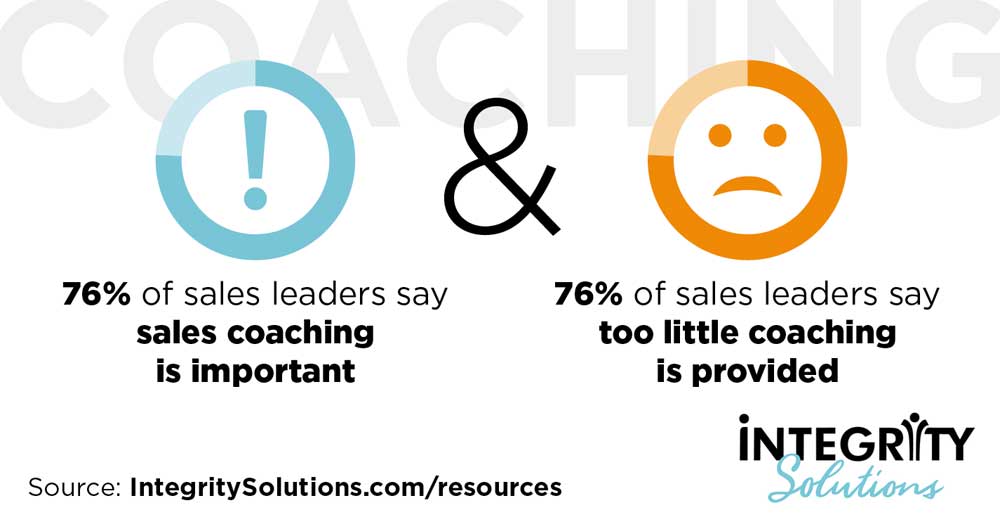
Whatever your sales leadership style, developing a team of sales professionals with a sense of ownership in the outcomes will lead to overall success.
Developing an awareness of your leadership style has never been more important than it is today. With employee turnover always an issue and remote and hybrid work changing the dynamics of the workplace, leaders need to focus on engaging and retaining their employees and helping them feel connected to the broader mission and purpose.
Once you understand your leadership style and its implications for how you manage and coach, you can take a much more strategic — and more effective — approach to creating the high-performing teams that will give your organization a distinct business advantage.
What’s your leadership style? Let’s take a closer look.
Is Your Sales Leadership Style People Focused or Goal Focused?

In most cases, sales leadership is a balance of two key traits — being goal-focused and being people-focused. When we work with leaders, whether they’re senior level leaders or frontline managers, we find that they tend to fall into one of four quadrants:
Some managers are overly focused on people and don’t want to hurt team members’ feelings by challenging them. While their intentions are good, the result is that their employees can end up stagnating in their careers and missing out on achieving what’s truly possible for them. They may become frustrated that they aren’t growing and demotivated because they believe their manager doesn’t see more potential in them.
Other leaders are directed by goals to the detriment of being sensitive to people’s feelings. At its extreme, this can be demoralizing and cause employees to disengage. It can also keep people from growing, especially if the manager’s behavior makes them believe they aren’t capable of higher performance.
Successful sales leaders have a blend of both traits and know how to be flexible to the needs of their team. It’s worth noting, though, that few leaders have a perfect balance between being people-focused and goal-focused. Most of us have natural traits in one and must work on the other. But by understanding your leadership style results, you can become more effective working with those you coach and with others in the organization as well.
Whatever your leadership style, you must be able to develop people who have a sense of ownership in the outcomes that define success. One of the primary advantages of knowing your style is that it will enable you to connect with people in a more meaningful way and communicate with greater clarity and impact.
Characteristics Of Specific Leadership Styles
Some characteristics of each leadership style are listed below. As you review them, think about which ones you believe are most descriptive of you and your style.
High People Focus / Low Goal Focus
- Relationship Driven, Loyal
- Social, Amiable
- Listens Selectively
- Sincere, Caring
- Lower Assertiveness
- Needs Approval of Others
- Low Goal Directedness
- May Have Difficulty with Decisions
- Avoids Confrontations
- May Fear Loss of Social Approval
- Fun Loving
High People Focus / High Goal Focus
- Clarity of Purpose, Direction, Goals
- Self-Confident
- Works Through People to Solve Problems
- Values Driven
- Decisive
- Builds People
- Results Oriented but Respects People
- Energetic
- Highly Intuitive
- Leads by Example
- Highly Responsible
- Excellent Listener
Low People Focus / Low Goal Focus
- Lower Energy
- Not Assertive
- Unclear Goals
- May Avoid Responsibility for Results
- Indecisive
- Seeks Security
- Process Focused
- Avoids Confrontation
- Low Initiative
Low People Focus / High Goal Focus
- Clarity of Own Personal Goals
- Extremely Self-Confident
- Assertive
- Less Sensitive to Feelings and Thoughts
- Very Decisive
- High Energy
- May Be Confrontational
- Self-Focused
- Distracted Listener
- Results Oriented
- Highly Responsive
- Concerned About Loss of Authority
Keep in mind, few people are a single quadrant style — most have traits that fall into two quadrants, sometimes three. However, one quadrant will usually be dominant.
Leadership Gap Analysis
It’s important to recognize that you have to put in the work if you want to get the results. Moving into Quadrant 2 is a growth process that involves intention and effort on your part.
To develop your own personal action plan, first, do a quick gap analysis: Assess your current leadership style, compare that with your desired style and then set goals to close the gap between the two.
Next, spend some time thinking about what you can do to build more self-awareness and enhance your personal leadership effectiveness. Here’s a quick guide to get you started:
- How would you describe your current leadership style?
- What do you consider to be your greatest strength?
- What qualities of leadership would you like to further develop?
- What specific actions will you take to strengthen these areas?
One of your most important jobs as a leader is to make sure your employees are engaged, growing and feel personally connected to the mission. That means helping them recognize what’s possible for them to achieve and then coaching them to unleash their full potential. But you can’t be effective at helping them grow if you ignore your own personal development.
Now that you have an idea of what your leadership style is, it’s time to do the work and elevate your leadership game. Because once you do, everyone will benefit.
Qualities Of Sales Leaders and Sales Coaches
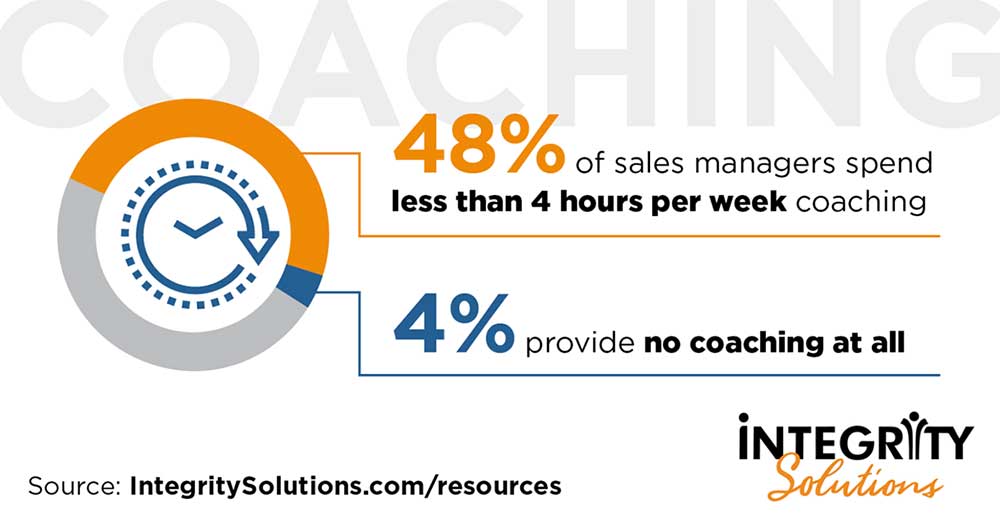
Sales people will go the extra mile for leaders they trust.
Being successful in sales, it’s all about the numbers, right? Quotas, pipelines, forecasts, we’re laser focused on hitting those numbers. But is reaching a number really the right motivation for all sales professionals?
What Motivates Top Sales People?
Chester Elton and Adrian Gostick, authors of “The Best Team Wins,” analyzed the responses from more than 5,800 salespeople who took their Motivators Assessment, and it turns out that most salespeople say they aren’t working for the number. Instead, they found that the top sales motivators are things like family, making an impact, learning, solving problems and developing relationships. Not even money—the classic score-keeping tool in sales—made the top 20.
Of course, motivation is something that comes from within, and different people are motivated by different things. This is why sales leaders look for ways to unleash that motivation—and the hook they often use is the number. The assumption: Working for the number keeps that fire lit.
It’s Not Always About the Number
The problem with this approach is that people are willing to let a number down. It’s not personal. It’s not the purpose. It’s not something to believe in. Yet most companies choose to sacrifice the people for the numbers, not the numbers for the people. And as author Simon Sinek points out, “That’s a little bit backwards. When you put the people first, watch what happens to the numbers. The people will give more and more.”
Just think about the leadership qualities in the best bosses you’ve had in your career. Sure, they had high expectations for you. They likely also saw your full potential (even when you didn’t) and held you accountable to yourself so that you could achieve those expectations. They spent the time and invested in your growth. And because they “walked the walk,” they inspired you with the impact you could make. They believed in you, and because of this, they could be brutally honest with you. You didn’t like it, but you knew they had your best interest in mind. You trusted them. And you didn’t want to let them down.
Salespeople may not be willing to go to bat for a number, but they will put it all out there for a leader they trust and respect. And the leaders who are most effective at this are those who excel at and are committed to coaching their people.
4 Leadership Qualities of Effective Sales Coaches
When you consider those things effective sales leaders do to develop high-performing, highly motivated sales teams, you’ll notice that coaching is ultimately the enabler. It’s how they do it. And it’s why they’re the ones who consistently earn respect, build trust, and attract and retain top salespeople.
Let’s take a closer look at a few of these leadership qualities.
1. Sales Coaches Build Strong Relationships.
Research has found that two-thirds of U.S. managers are uncomfortable talking with their employees. That’s a pretty astounding number. Obviously, you can’t build relationships with your people if you’re scared to talk to them. The question is, why are so many managers so uneasy?
One reason is that they simply don’t know how to communicate effectively with their people. This is particularly true in sales, where people are often promoted because they’re good salespeople, not because they know how to lead people. Another common argument we’ll hear from sales managers is that they don’t want to “bother” or micromanage their people.
The reality is, most people want the check-ins and the follow-up. They want to be able to gauge how they’re doing, and they want the pats on the back when they hit the milestones. That’s how they know their manager is truly invested in their success. The good news is, learning how to communicate and coach is a lot easier than people might think.
In many ways, good coaching is like good selling. It’s not about showing up and telling, or having all the answers. It’s about asking good questions and recognizing that your people have the answers inside them. Your job is to bring those answers out, knowing that the tough questions you’re afraid to ask are more likely to strengthen the relationship than damage it.
2. Being Goal Oriented
We often ask sales leaders to estimate the percentage of people on their team who do goal setting—not for the goals the company made them do, but their own personal, written goals. Pretty consistently the answer to that question is “maybe one percent.”
Building a strong relationship and opening the lines of communication with your team members are critical leadership qualities; but effective leaders also build trust by having a written plan they execute on. And they expect the same from everyone on their team. Good coaching practices balance the people orientation and goal orientation aspects of leadership, both of which are necessary for keeping people motivated and engaged.
3. Sales Leadership and Accountability
Accountability is key to sales teams achieving goals. But many managers believe that high-performing salespeople, in particular, don’t really need or want to be reminded or coached to stay focused. That’s hardly the case.
A salesperson once told me about the very thorough process she went through with her manager to set goals and create a plan with milestones to reach along the way. It was a great meeting and she left completely energized. Then she started achieving those milestones and goals. She wanted to share her successes and get that well-deserved pat on the back—who wouldn’t?—but her manager never checked back in.
Too many managers sit down once to go over goals and never follow back up, especially when the salesperson’s performing well. It’s a huge missed opportunity for strengthening the relationship, and it’s also a huge risk. After all, your top performers can easily take their talents elsewhere to get that acknowledgement.
4. Sales Coaches Are Always Redefining Their Own Success
Because so many in sales management are promoted from sales jobs, they often miss the immediate gratification that comes from closing a sale, and this means they can be tempted to step in and do it for the salespeople on their teams.
The practice of coaching is the most essential of all leadership qualities. It helps leaders change their mindset and gives them a new purpose. Their sense of personal satisfaction comes not from closing a deal but from coaching their sales reps to do it themselves. In the process, they’re empowering their people to be problem-solvers, building trust and developing bench strength for the future.
Developing and keeping high-performing salespeople is more than just a numbers game. People tend to respect the leaders they have a good relationship with and who hold them accountable to their goals. Whether they call it coaching or not, it’s what the most effective leaders know. And those are the leaders your salespeople will go the extra mile for.
The Skill Set Of Successful Sales Leadership

The effectiveness of any sales team starts with the sales leaders. It’s why many experts say any L&D spending should start (not end) with investing in your leaders. Simply adding more people to the team won’t deliver the scalability and dividends you’re looking for if your sales leaders aren’t willing to put in the work to create a culture of safety and empowerment that inspires confidence, continual development and genuine human connections.
In a tight job market where people have options — and in an economic environment that’s increasingly volatile and uncertain — salespeople want to work for sales leaders they can look up to.
They want leaders who recognize that a silent room doesn’t always mean everyone understood what they just said.
They want leaders who prompt a discussion to break the ice and confirm that everyone’s on board.
They want leaders who won’t push a sale when a customer’s goals and needs can’t be met (or even when a competitor is better suited).
They want leaders who not only seek to understand each person for what they bring to the table but also tend to see more in their people than they might see in themselves — and then spend the necessary time with them to help them achieve new levels of personal and professional success.
Ultimately, this is the kind of leadership that transforms sales teams and elevates business results. The sales leader is able to reach into the relationships with the people on their team, find out their strengths and goals and align those things with the jobs that need to be done in service of the customer. The question is, how well do your sales leadership skills measure up where it really counts?
Developing Sales Leadership Skills
Identifying a potential sales leader can be tricky. While it’s easy to think of the manager or leader position as the logical next step for someone who’s been successful as a salesperson, the two roles have vastly different responsibilities and require different skills and mindset. That’s not to say a top salesperson can’t excel as a sales leader. But they need to be aware of the differences and even the motivational mismatches that could derail their effectiveness.
For example, a star salesperson who’s used to a comp plan that rewards them when they close deals will face a stark change in how they’re compensated when they become a leader. As a result, you could be taking a highly motivated person and removing not just the financial incentives but also the personal satisfaction and fulfillment that fuels their motivation.
Don’t set a potential leader (and their entire team) up for failure by hiding the reality. Instead, focus on what their inner drivers are and help them get clear on what it means to be a leader and the different kind of fulfillment they can enjoy by helping others reach their potential.
6 Elements Of Great Sales Teams
Strong leadership and a positive culture are the foundation for sales team success. Once those are in place, development that focuses on building competencies across a few key areas will move the team to the next level.
- Knowing When To Walk Away
- The Art Of Asking Great Questions
- Showing Up With Confidence and Humility
- Building Great Connections
- Patience
- Giving Generously
Sales Leadership Skills and Trust
The ultimate sales leadership skill is engendering trust. And to build trust with others, it’s important to recognize that trust is both a noun and a verb. How do you get more of the noun? By using more of the verb. Their first and foremost thought is “how can I serve and grow you?” And so a trust bond develops. They ask questions to understand and that enables that person to be successful.
Leaders must go first. They need to show up every day doing things that build trust, offering people the chance to do something new or outside of their comfort zone and allowing them to fail sometimes along the way. They listen more and remember that their team members need their ears more than they need answers.
Creating A Sales Culture
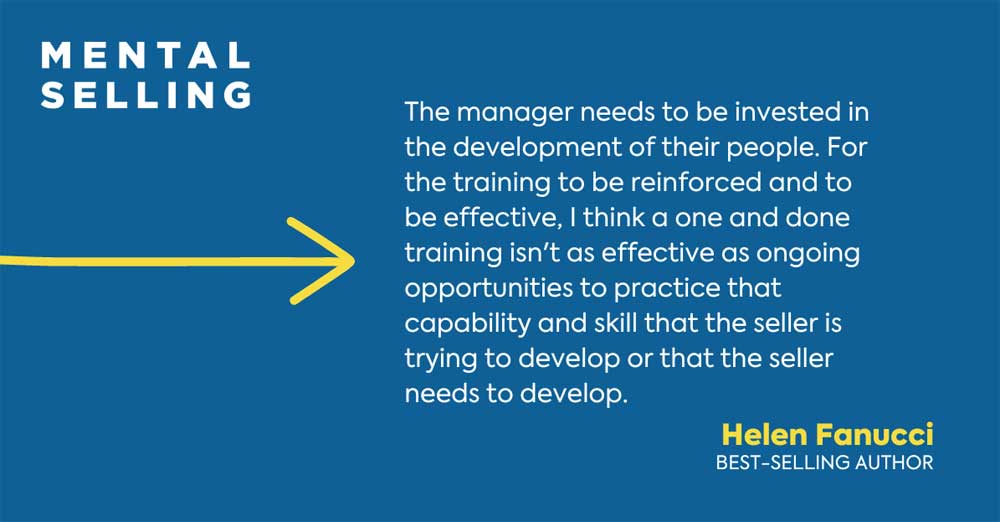
Organizations with great sales cultures have a way of attracting and keeping great salespeople — not just because salespeople can be financially successful in these cultures, but also because they’re more supported and confident in their ability to achieve their sales goals, more fulfilled in what they do, and more passionate about the work and the impact they have. They’re purpose-driven, because the culture sets the tone.
What A Sales Culture Looks Like
Sales managers are pivotal for any sales team to reach and exceed their goals, but true sales leadership is about more than managing numbers and pipelines, rather they focus on creating a people-first sales culture.
One of the hallmarks of a purpose-driven culture is a commitment to selling with values and integrity. But what does that look like in practical terms? There are 3 areas that these cultures pay close attention to:
- Sales conversations with not just customers, but also their leadership and themselves.
- Congruence of everyone’s goals.
- Clear understanding of what sales coaching means
Successful sales leaders make time for coaching. They view sales coaching as building a sales culture which creates trust between them and their team.
Read more about building a sales culture.
Enhancing Sales Leadership With Coaching
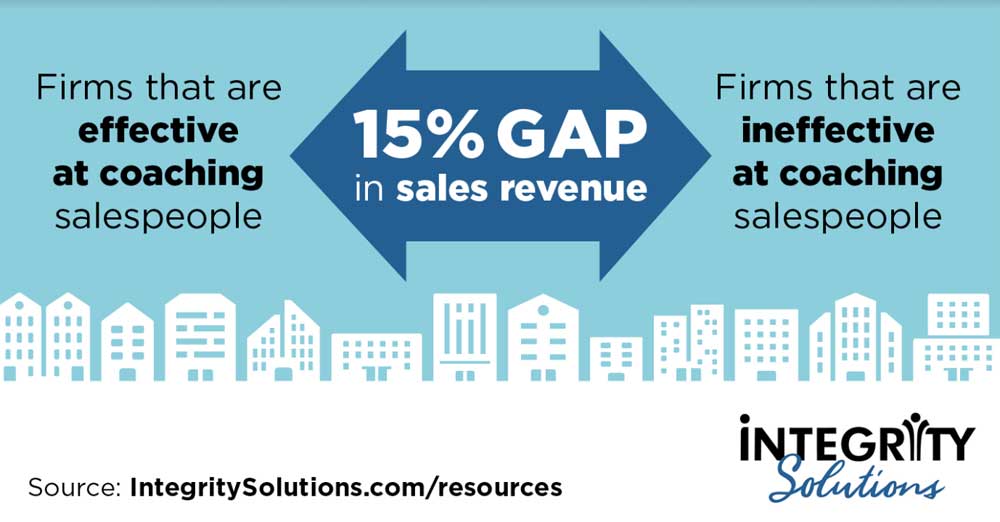
Great sales team coaching takes specific knowledge and functional expertise to build a successful team. On their own, these aren’t enough to bring out the best in their sales teams and help them achieve their full performance potential. By adding Emotional and Social Intelligence to the coaching model, sales team coaches can discover amazing success.
Social and Emotional Intelligence
More than IQ, research shows that up to 90 percent of performance effectiveness is due to emotional savvy rather than technical knowledge. And this is particularly applicable when we’re talking about the effectiveness of team coaches.
Emotional and Social Intelligence For Sales Coaches
Emotional Intelligence produces traits such as stability, persistence, the ability to stay calm under pressure and resilience in the face of challenging situations and change. Whether it’s sales, service or other functions, most teams today are dealing with these kinds of realities on a daily basis. So while it’s true that IQ and functional knowledge are the baseline competencies for any effective leader, especially in this kind of environment, high Emotional Intelligence is critical for becoming a strong team coach.
The good news is that, unlike IQ, which is essentially fixed, Emotional and Social Intelligence can be developed.
Emotional Intelligence and Sales Coaching
Emotional Intelligence and Social Intelligence are closely related. Emotional Intelligence is the self-mastery that enables leaders to deal with their own responses in business interactions. Emotional Intelligence guides a leader’s thinking and behavior.
Social Coaching With Social Intelligence
Social Intelligence, meanwhile, is the ability to effectively negotiate complex relationships and environments. Social Intelligence helps leaders see the world as others do and to listen without bias.
Team leaders who develop their own Emotional and Social Intelligence have the potential to become great coaches because they can make the critical connections with their team to expand their belief boundaries and reach higher levels of performance.
Sales Leaders Coach Teams To Believe In Themselves And Others
A sales leader’s ability to develop high performance through coaching begins by expanding team members’ belief boundaries. Team coaches who understand members’ beliefs and values, and who are able to connect with them on an emotional level, can more positively impact their feelings about success, their actions and behaviors, and their overall abilities and performance.
Expanding a team’s belief boundaries starts with a coach’s own belief boundaries — their ability to shift their mindset during interactions with their team and, in particular, as they prepare for coaching sessions. Below are a few examples of the mindset shifting that’s required to be an effective coach.
Infographic: See How Top Companies Use Sales Coaching

We know how critical coaching is to sales success, and that high-performing companies integrate it as a critical component, but many still grapple with barriers or behaviors that get in the way of successful coaching. Our research conducted in partnership with the Sales Management Association explores why and how some organizations use coaching successfully to drive sales performance while others still struggle to make it work.
This infographic summarizes our research findings and identifies those stumbling blocks while uncovering the winning formula for organizations that truly excel at sales coaching.
Recruiting The Right Sales Team Members
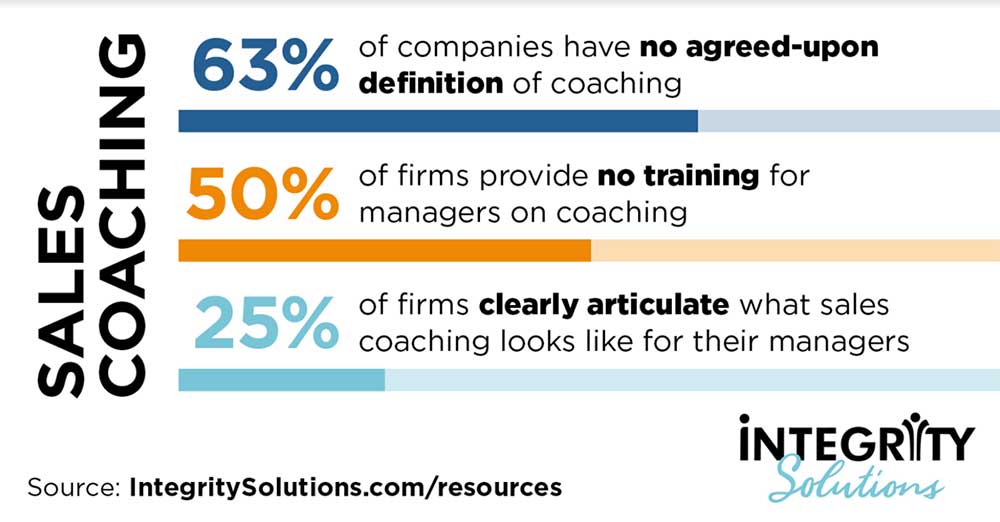
Effective sales recruiting strategies start with a well-defined Sales Success Profile based on objective performance criteria. Here’s how to consistently identify, attract and retain candidates with the talent and experience to become high performers.
As a sales manager, it’s pretty frustrating when you spend a significant amount of time and energy coaching and developing someone only to discover in the end that, well, it’s not you, it’s them. In some cases, it’s not about the salesperson’s knowledge and skills or even their passion for your products or services. We’ve found that there are a number of specific characteristics and capabilities that suggest whether someone is more likely to become a high performer
It seems like a no-brainer: How could you go wrong with sales recruiting strategies focused on hiring people with a passion for selling? With consistent, effective coaching, these are the salespeople who will be most likely to deliver exceptional value to customers and differentiate you in the marketplace. Identifying and recruiting the “right” salespeople may be your best opportunity to reduce sales burnout and cut retention issues later off at the pass.
Strategies For Recruiting Top Sales Talent
An effective and deliberate selection process is essential to recruiting salespeople who will become top performers. Most companies know this. They recognize that getting the “right people” on board—those who are most likely to practice customer needs-focus—is mission critical. But despite their best efforts, they struggle to consistently hire salespeople who will ultimately measure up to these lofty standards.
The reason: Most organizations have not clearly articulated what characteristics are most predictive of success.
This problem cannot be overstated. Although there isn’t a one-size-fits-all profile, organizations often find it difficult to nail down the key dimensions that determine someone’s performance and success. It doesn’t matter how great of an interview you have with the person, if you don’t know what you’re looking for—if you aren’t clear on the pivotal qualities that drive sales success at your company—then you’re leaving a lot to chance.
The result is sales managers hiring the “wrong” people, high sales rep turnover, decreased productivity and job satisfaction, and lost revenue. The average annual turnover for sales teams is near 30%.
Building A Sales Success Profile
Effective sales recruiting strategies and processes start with a well-defined Sales Success Profile based on objective performance criteria. Ranking your best salespeople and identifying the qualities and abilities that lead to their consistent performance will help you identify new candidates with similar talent and experience to become high performers for you.
And when assessing the practices and behaviors of top performers, it’s important to go beyond just skills and competencies. Our studies have consistently shown that attitudes, beliefs and values—factors that rarely show up on a resumé—are the characteristics that most often separate top performers from everyone else. Put another way, success in sales has more to do with who you are than what you know.
Through our work, we’ve identified 18 key dimensions that impact the performance and success of sales professionals around the world. This is a good starting point for developing your own Sales Success Profile:
- Goal Clarity
- Achievement Drive
- Emotional Intelligence
- Social Skills
- View of Selling
- View of Abilities
- Values
- Commitment to Activities
- Belief in Product/Service
- Coachability
- Contact Initiation
- Approaching
- Interviewing
- Demonstrating
- Validating
- Negotiating
- Close
- Follow-Up
The list to determine which dimensions stand out in your top performers compared to the rest of your salespeople. Then prioritize the dimensions that represent the largest gaps between your high and low performers. After taking into consideration strategic and market challenges, you can further narrow it down to the 5 to 10 dimensions that are most predictive of sales success in your organization.
3 Stages of An Effective Sales Team Recruiting Process
The Sales Profile will help you develop a concise but effective assessment tool for determining which job candidates are most likely to succeed. This will focus your interview team on asking the right questions based on a candidate’s individual scores as compared to your organization’s top performers. Those who score higher are more likely to have what it takes to become successful sales professionals in your organization, assuming that they reinforce their scores with responses that validate their job fit.
This assessment is part of an effective three-stage sales recruiting process:
- Focusing & Preparing: Qualifying the candidates and preparing for the interview.
- Behavioral Interviewing: Asking targeted questions that reveal experience, values, actions and results.
- Assessing & Closing: Using informed and unbiased decision-making, and selling your opportunity.
In this process, each stage enables the next, providing a seamless methodology that consistently produces predictable results.
The Right Sales Team To Serve Customers
There’s no silver bullet for recruiting the right person for sales, and no process is entirely foolproof. But getting a better understanding of the most predictive traits for sales success in your organization will make a huge difference, not only in your ability to hire effectively but also in how you coach and develop individual salespeople to bring out their full potential. All those things will ultimately help you serve your customers better. And isn’t that the whole point?
The day-to-day performance of your employees and how they serve customers can be your brand’s primary differentiation. When you factor in the time, money and resources you have to commit to develop a productive new hire, establishing rigorous and disciplined sales recruiting strategies is a small price to pay for a big payoff later.
Understand The Behavior Styles Of Your Sales Team
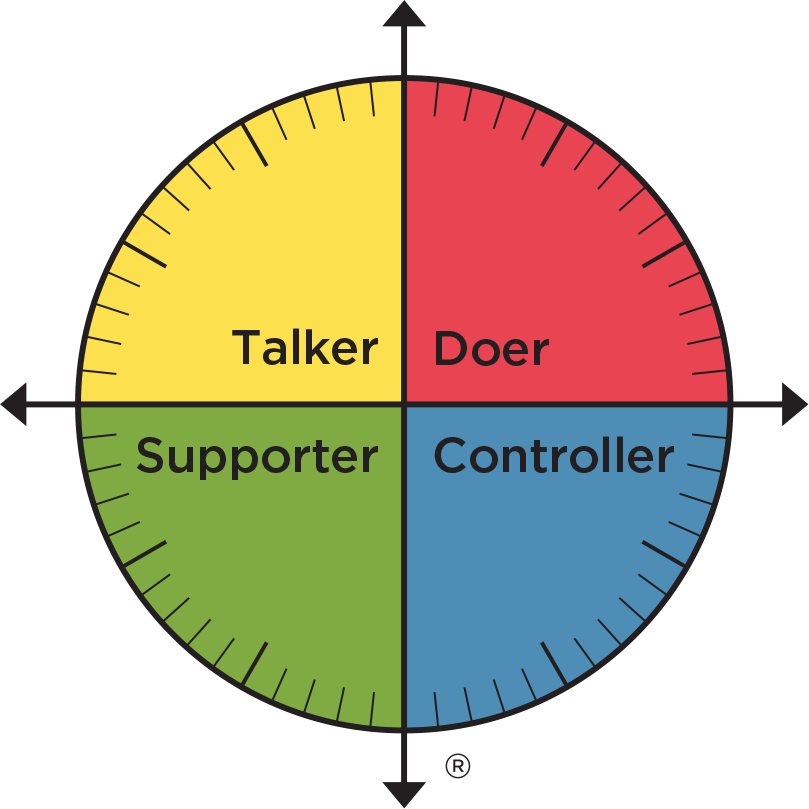
Whether you’re a coach or a salesperson, if your communication approach is overly tilted toward your own dominant human Behavior Style, you risk ignoring or failing to connect with the other person and what they care about most.
While you may already be familiar with Behavior Styles and how they apply to sales and coaching situations, the shift to remote work — not to mention the stress many are under — has added a new dimension to the way we interact. By understanding and adapting to the human Behavior Styles of others, you can build trust and rapport even from a distance. And that’s essential in today’s environment, both for meeting revenue goals and for keeping employees engaged.
The tipping point between satisfied and loyal, whether you’re talking about customers or employees, is all about value. Loyal customers and employees don’t just receive value from us, they feel valued by us. And the way we make sure they feel valued is to understand their Behavior Style and honor their preferred communication style. It’s why effective, efficient communication is one of the last competitive advantages we have.
Using Behavior Styles To Identify Strengths and Weaknesses
The first step is knowing your own style. While most people have one or two dominant styles, everyone is a combination of styles. Whether you’re a coach or a salesperson, if your communication approach is overly tilted toward your own dominant human Behavior Style, you’ll risk ignoring or failing to connect with the other person and what they care about most.
With continued change and disruption hitting the workplace, it’s even more important to get your messages across clearly and empathetically. Identifying and connecting with the other person’s Behavior Style should always be part of your pre-call planning and coaching discussion prep.
Behavior Styles
As outlined below, each style has strengths and challenges, and that will impact your planning. Consider which of these tendencies may apply to you as the coach or salesperson, and then review the tendencies with your audience in mind to determine how to best serve their communication needs.
Talkers

Talkers are great at establishing relationships. They’re creative, inspiring and light up the room.
But right now, they may be feeling stuck in the rigid routine of social distancing or staying home. They may also be struggling with lack of structure, planning and focus.
In order to provide coaching for Talkers, assess if those challenges are impacting their productivity. If so, help them draw on their strengths to identify creative solutions to stay motivated and attentive to the details.
Doers

Doers are dialed in on the end results, and like the name says, they do what’s necessary to make it happen. Because they’re decisive and fearless, you can count on the Doer to step up when action’s needed.
Doers call it like they see it and have the courage to tell the truth from their perspective. But that candor is not always welcome. Another potential pitfall for Doers is impatience. We are communicating one hundred percent of the time, whether we’re speaking or listening, and impatience can be really obvious to the person with whom we’re talking.
When coaching a Doers, make it clear your intention is to equip them to achieve their goals and enjoy greater success. Ask questions to help them identify and remove obstacles that could get in the way.
Controllers
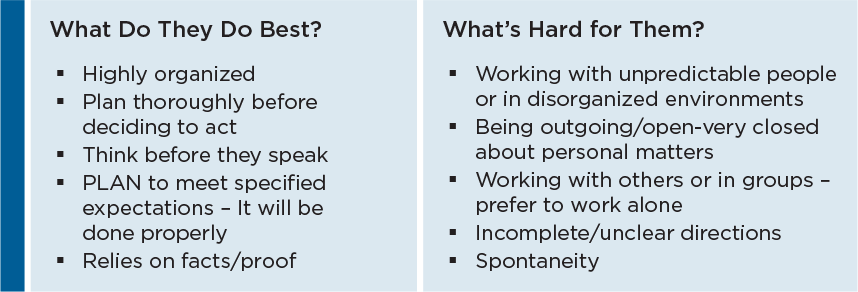
Controllers like to plan before they act and think before they speak. Thoroughness and attention to detail helps them bring logic and balance to the decision-making process.
Controllers prefer to work alone and are less likely to share personal information.
They also dislike unpredictability and spontaneity — which can make today’s environment very challenging for them.
Some advice for coaching Controllers is to prepare for the conversation with a clear objective in mind, and review and bring any relevant reports or data. Recognize that they prefer to have time to plan for change.
Supporters

Supporters value people. They’re quick to serve and be others-focused. They’re the most natural listeners because they’re genuinely interested in what people have to say.
Because Supporters want everyone to win, competition can be difficult for them. They have a natural tendency to value people, so it’s tough for them to work with people who don’t share that perspective. And they don’t want to hurt people’s feelings, which can make it hard to voice contrary opinions. To avoid risk Supporters will look at things from all angles before moving forward. Pressure is unsettling, so they can end up in analysis paralysis.
The best way to coach Supporters is to provide the employee with an agenda of the coaching session and topic in advance. You can also make it easier for Supporters to express their opinions by helping them see how their perspective will serve another person’s growth or the broader purpose. Recognize that changing course quickly isn’t easy for them, so they may be struggling with the abrupt changes of the past few months.
Sales Leadership, Sales Coaching and Selling With People In Mind
Stress is part of the equation right now, and stress tends to bring out even more of our dominant style tendencies. Self-awareness is critical to recognizing when you might be getting so out of balance that it’s becoming detrimental to effective communication and relationships.
We expect grace as leaders and coaches when we’re under stress, hoping people will judge us based on our intentions and motives and not necessarily our behavior in the moment. Be aware of how stress may also affect your customers’ and employees’ human behavior. Extend that same grace to your customers and employees, and they will more likely feel valued.Find out more about Behavior Styles and find out how Behavior Styles Assessments from Integrity Solutions can help you and your sales team become more intuitive about selling.
Transforming Managers To Leaders With Integrity Coaching®

Most sales leaders know how to manage what’s urgent and most pressing. But truly great leaders know the distinction between managing and coaching- and consistently coach their teams to help them reach greater levels of achievement than they might believe possible for themselves. When leaders both manage and coach, there’s stronger, more steady performance in good times and when the going gets tough.
Integrity Coaching® is a systematic, disciplined process that equips your leaders with the SKILLS to coach with integrity while adapting to different situations and different styles, and the MINDSET to make coaching a natural, consistent habit. Equip your people to elevate performance across the entire organization.
Integrity Solutions
Related Blog Posts



